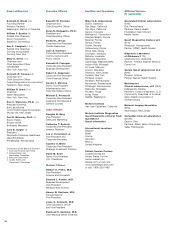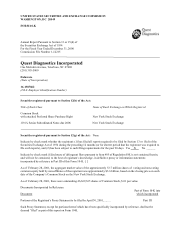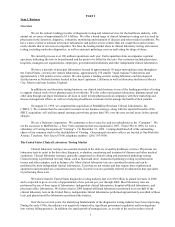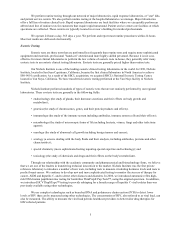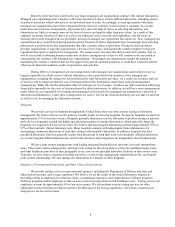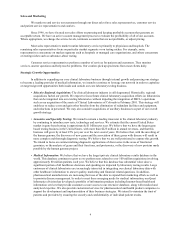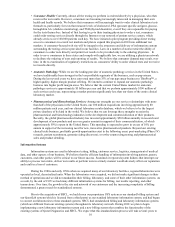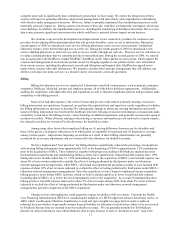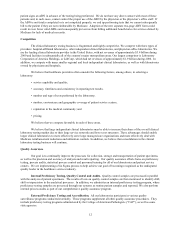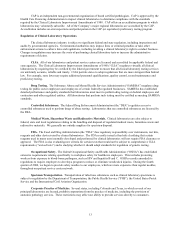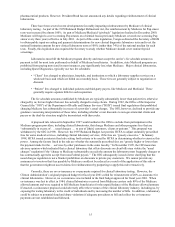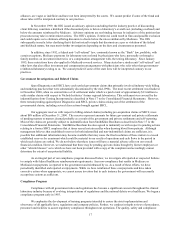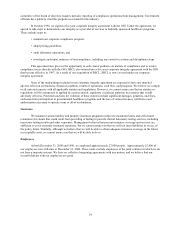Quest Diagnostics 2000 Annual Report Download - page 28
Download and view the complete annual report
Please find page 28 of the 2000 Quest Diagnostics annual report below. You can navigate through the pages in the report by either clicking on the pages listed below, or by using the keyword search tool below to find specific information within the annual report.8
Recently, there has been a shift in the way major managed care organizations contract with clinical laboratories.
Managed care organizations have begun to offer more freedom of choice to their affiliated physicians, including greater
freedom to determine which laboratory to use and which tests to order. Accordingly, several agreements with major
managed care organizations have been renegotiated from exclusive contracts to non-exclusive contracts. As a result,
under these non-exclusive arrangements, physicians have more freedom of choice in selecting laboratories, and
laboratories are likely to compete more on the basis of service and quality rather than price alone. As a result of this
emphasis on greater freedom of choice as well as our enhanced service network and capabilities, and our focus on
ensuring that overall arrangements are profitable, pricing of managed care agreements has improved. Also, managed care
organizations have recently been giving patients greater freedom of choice and patients have increasingly been selecting
plans (such as preferred provider organizations) that offer a greater choice of providers. Pricing for these preferred
provider organizations is typically negotiated on a fee-for-service basis, which generally results in higher revenue per
requisition than under a capitated fee arrangement. We cannot assure investors that these trends will continue, that we
will be successful in obtaining business under non exclusive arrangements or that we will continue to be successful in
renegotiating our contracts with managed care organizations. If managed care organizations resume the pattern of
negotiating for exclusive contracts that involve aggressively priced capitated payments, it could have a material adverse
effect on our financial condition, results of operations and cash flow.
During 2000, we renegotiated several arrangements with managed care organizations under which we are no
longer responsible for all the costs of clinical laboratory services provided to the members of the managed care
organizations, including the charges for tests performed by other laboratory providers. As a result, net revenues and cost
of services will no longer include the cost of testing performed by third parties under these network management
arrangements. While this has the immediate effect of reducing our net revenues, it reduces our risks associated with being
financially responsible for the costs of tests performed by other laboratories. In addition, we still have some arrangements
under which we are responsible for forming and managing for the benefit of a managed care organization a network of
subcontracted laboratories. Under these arrangements we receive fees for the clinical laboratory services that we perform
as well as a fee for managing the laboratory network.
Hospitals
We provide services to hospitals throughout the United States that vary from esoteric testing to laboratory
management. We believe that we are the industry's market leader in servicing hospitals. Testing for hospitals accounts for
approximately 11% of our net revenues. Hospitals generally maintain an on-site laboratory to perform testing on patients
and refer less frequently needed and highly specialized procedures to outside laboratories, which typically charge the
hospitals on a negotiated fee-for-service basis. We believe that most hospital laboratories perform approximately 95% to
97% of their patients' clinical laboratory tests. Many hospitals compete with independent clinical laboratories by
encouraging community physicians to send their testing to the hospital's laboratory. In addition, hospitals that have
purchased physicians' practices generally require their physicians to send their tests to the hospital's affiliated laboratory.
As a result, hospital-affiliated laboratories can be both customers and competitors for independent clinical laboratories.
We have joint venture arrangements with leading integrated health delivery networks in several metropolitan
areas. These joint venture arrangements, which provide testing for these hospitals as well as for unaffiliated physicians
and other healthcare providers in their geographic areas, serve as our principal laboratory facilities in their service areas.
Typically, we have either a majority ownership interest in, or day-to-day management responsibilities for, our hospital
joint venture relationships. We also manage the laboratories at a number of other hospitals.
Employers, Governmental Institutions and Other Clinical Laboratories
We provide testing services to governmental agencies, including the Department of Defense and state and
federal prison systems, and to large employers. We believe we are the leader in the clinical laboratory industry in
providing testing to employers for substance abuse, occupational exposures, and comprehensive wellness programs.
Wellness programs enable employers to take an active role in lowering their overall healthcare costs. Testing services for
employers account for approximately 6% of our net revenues. We also perform esoteric testing services for other
independent clinical laboratories that do not have the full range of our testing capabilities. All of these customers are
charged on a fee-for-service basis.


